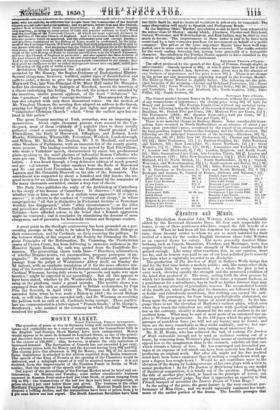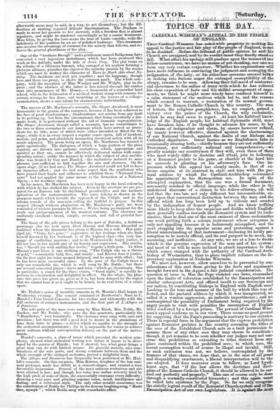tfitrto auti
The Elizabethan dramatist John Webster, whose works, admirably edited by the Reverend Alexander Dyce, fill four such respectable vo- lumes, is one of those gentlemen who-have reaped the full benefit of a reaction. When he had been all but forgotten for something like a cen- tury, those literary critics to whom we are so much indebted for their revival of a taste for the earlier Enflish literature chose John Webetor as an especial theme for eulogy. The more generally familiar Eliza- bethans, such as Jenson, Beaumont, Fletcher, and Messinger, were less respectfully treated ; but the rude strength of Webster could hardly be praised enough. Like many other reactions, this, in our opinion, went too far, and an honour was paid to one of our least polished poets scarcely less than what is rightfully awarded to an fEschylus.
The production of The Duchess of _Kopf at Sadler's Wells brings this idol for the first time before a modern public; and, like many other idols, he will gain little by ocular inspection. As a whole the play is but a sorry work, showing equally the strength and the untutored condition of the mind that produced it. The story, setting forth the slow process by which two fiendish brothers murdered their sister, a regnant duchess, as a punishment for a mesalliance, has in itself no further interest than may be found in any atrocity of journalistic renown. The accumulated horrors of the fourth act, which give the play its character, are followed by a fifth so feeble and ridiculously murderous, that nothing can exceed the anti- climax. The personages, far from being psychologically elaborated, are flung upon the stage as so many lumps of moral deformity. In the lan- guage there is not the elevation of Marlowe's earliest plays, which even when they touch the ridiculous are still replete with poetical sublimity ; but on the contrary, ideality is shunned for the sake of realism in its un- couthest form. What may be said of most poets of an untutored age ap- plies to Webster in particular. In the 160 pages which his play occupies, passages of matchless force (we will not say beauty) may be found ; and these are the more remarkable as they strike suddenly, and we feel our- selves unexpectedly moved after long tasting most unsavoury fare. Mr. R. R. Home, who has achieved the task of making The Duchess of Haljf endurable enough not to send an audience rushing out of a house, by removing from Webster's play those moans of excitement which appeal less to the imagination than to the stomach, exhibits all that care which attends a labour of love. He has rearranged and dovetailed pas- sages at an expense of toil which can have been scarcely less than that of producing an original work. But after all, might not his fine poetical mind have been better employed than in making a rough-hewn work ap- pear a degree less rough-hewn ? Would he not contribute more to the elevation of the drama by looking over one of his own plays with a view to scenic production ? As for The _Duchess of MO being taken as any model of theatrical composition, it is totally out of the question. Placing it by the side of another play which is based on the principle of terror, can any impartial, practical judge, lay that it approaches an equality to that French banquet of atrocities the Lucrece Borgia of Victor Hugo ? In the acting of the piece, the great feature is the very excellent per- formance of Miss Glyn ; and we would especially commend her treat- ment of the earlier portion of the drama. The forcible passages that afterwards occur may be said, in a way, to act themselves; but the dif- ficulties at starting required delicate discrimination. 'The Duchess is made to avow her passion 'her steward, withw freedom that is almost repulsive, and might be Tendered exceedingly so 'by a coarse 'treatment. Miss Glyn, by giving thelove-scene the tone of haute comedie,Teils.the indelicacy of -the position by an air of polished badinage. This treatment also secures the advantage of contrast forthe misery that follows, and re- lieves the general ghastliness of the play.



























 Previous page
Previous page